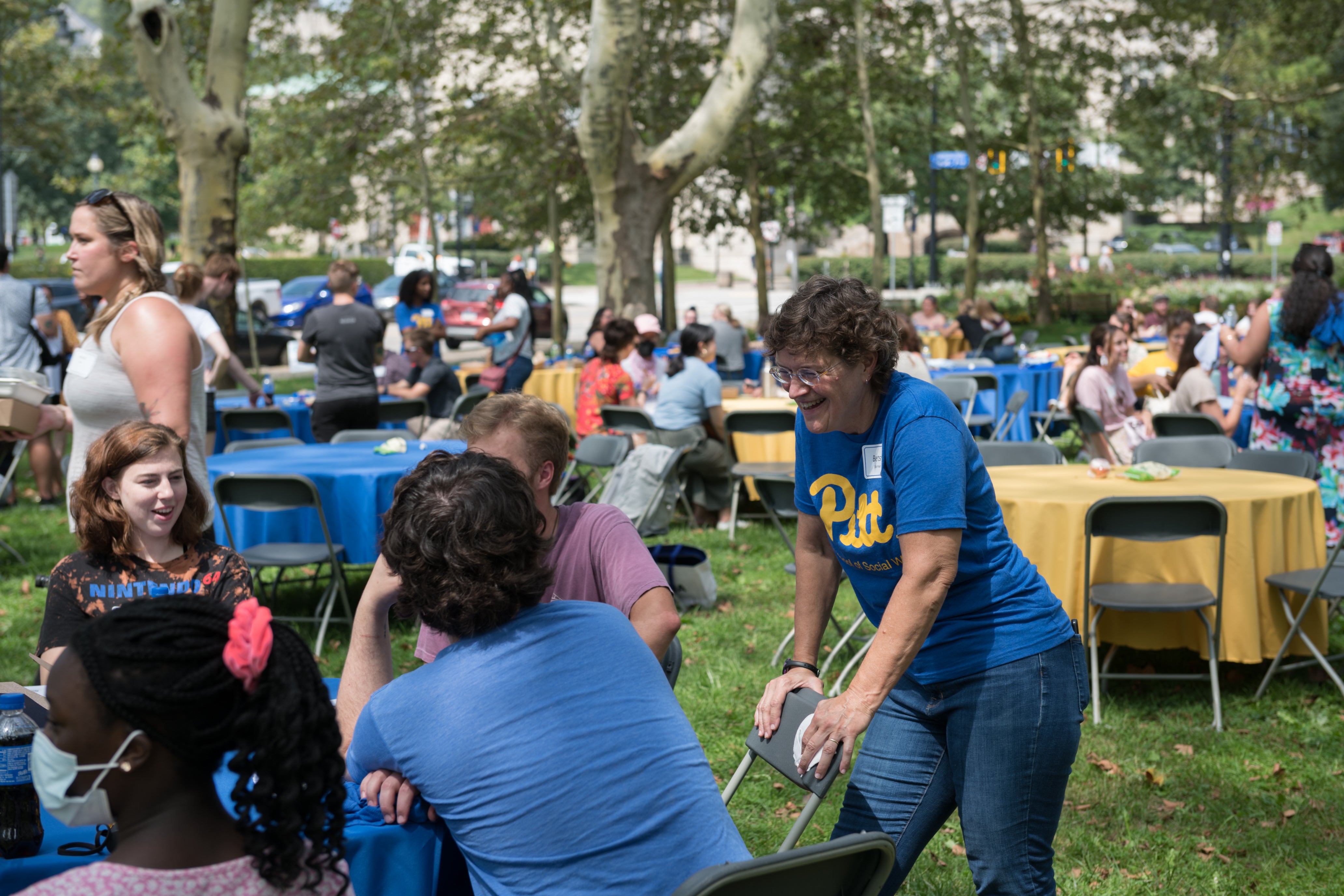
Community organizing practice acknowledges community as a social environment that is broadly defined and rich in diversity. MSW practitioners often find themselves working in community-based agencies and community organizing settings addressing a variety of planning, development, and social change issues. To prepare students to become leaders in this field, MSW students in the COSA specialization have the opportunity to obtain the nationally recognized COSA Community Organizing and Practice Certificate. This certificate, developed through a partnership with the Association for Community Organization and Social Action (ACOSA), helps to define and affirm community organizing practice competencies that have become increasingly important to the careers and advancement of MSW professionals.
This certificate is available only to students currently enrolled in the University of Pittsburgh’s School of Social Work’s MSW Program at the Oakland campus. MSW students complete required and elective courses along with a specialized practicum placement leading to the COSA Community Organizing and Practice Certificate within the normal MSW requirements and need not exceed the length of the degree program. As a University of Pittsburgh-recognized certificate program, receipt of the COSA Community Organizing and Practice Certificate appears on graduates’ MSW diplomas.
COSA students have the opportunity to focus their studies in community organizing practice on the field of gerontology. With careful planning starting at the time of initial matriculation into the MSW Program, students can complete both the COSA Community Organizing and Practice Certificate and the COSA-Gerontology Certificate. Please contact Dr. Rafael Engel (rengel@pitt.edu), Gerontology Certificate Chairperson, for additional information.
MSW students who complete the requirements for the COSA-Community Organizing Practice Certificate will receive a one-year membership to ACOSA, which includes access to the Journal of Community Practice.
COSA Community Organizing and Practice Certificate Curriculum
Required Courses
Students pursuing the COSA-Community Organizing Practice Certificate must fulfill all MSW Program and COSA specialization requirements as well as complete specific courses that support the certificate. Therefore, in addition to a second-level Human Behavior course (SWBEH 2008), a second-level Social Welfare course (SWWEL 2087), a second-level Research course (SWRES 2041), and two electives, students seeking this certificate must complete twelve credits through the following COSA core and COSA skill elective courses*:
SWCOSA 2084 Human Service Organization Management (requirement for all COSA students)
SWCOSA 2088 Community Organizing and Planning (requirement for all COSA students)
SWCOSA 2090 Working with Group/Intergroup Relations: Facilitation, Negotiation and Mediation (Required COSA skill elective for the certificate)
SWCOSA 2096 Community Planning and Development (Required COSA skill elective for the certificate)
*This coursework covers ACOSA competencies in the areas of community organizing, community planning, community development, and community social change, and meets the ACOSA standards for its Community Practice certificate. For more information about the ACOSA certificate and certificate competencies please see the ACOSA website.
Review sample course of study models for the COSA Community Organizing and Practice Certificate
Required Practicum
COSA-Community Organizing Practice Certificate students must complete their specialization practicum placement (SWCOSA 2099; 12 credits – 720 clock hours) in a community practice setting to apply the knowledge, values, and skills they are learning through their coursework.
Certificate Declaration Form
If not already declared as part of the admission application, an MSW student should submit a Certificate Declaration of Intent Form as soon as possible after beginning the MSW Program to affirm their interest in pursuing the COSA Community Organizing and Practice Certificate as part of their MSW studies.
Financial Aid
Students pursuing the COSA Community Organizing and Practice Certificate are eligible for the same financial aid and loan options available to all MSW students. In addition, students completing this COSA certificate are encouraged to apply for stipends through the Library Social Work Fellowship, wherein students complete their field placements in public libraries to assist with a variety of organizational and public-facing activities.
Career Opportunities
The COSA Community Organizing and Practice Certificate opens the door to a range of exciting and meaningful professional opportunities. Students who have completed this certificate have found employment with nonprofit and community-based organizations, foundations, labor unions, advocacy and lobbying groups, and government agencies. MSW graduates who have earned the COSA Community Organizing and Practice Certificate are found working at local, state, and national levels, providing their macro social work practice expertise to community organizing and mobilization efforts; program development, planning, and assessment projects; fundraising and grant writing; advocacy and lobbying endeavors; and community-based social and economic development initiatives. COSA Community Organizing and Practice Certificate graduates, regardless of their specific sphere of work, are leaders who place a commitment to empowerment, community-building, and social change at the center of whatever they do.
The School’s Resources
The MSW Program’s COSA specialization builds on a long and rich history of partnerships between the school and community groups in Western Pennsylvania that is unique among U.S. schools of social work. Courses are taught by full-time and part-time faculty who bring their experiences as community practitioners to the classroom. Faculty play important roles in Pitt’s community engagement initiatives. They are leaders in the field of macro social work practice, exemplifying the “practitioner/scholar” ideal through their active involvement in community-engaged research projects as well as their publications. The rich diversity of practicum placement options available to students reflects the COSA faculty’s strong ties to community groups. Practicum placement opportunities allow students to work directly with community members and community agencies.
For More Information
For additional information about the COSA-Community Organizing Practice Certificate, please contact:
Dr. Mary Ohmer
COSA Chair and COSA-Community Organizing Practice Certificate Coordinator
mlo51@pitt.edu
Interested in learning how to apply for admission to the MSW Program?
